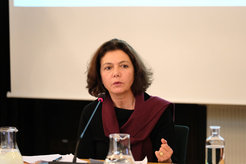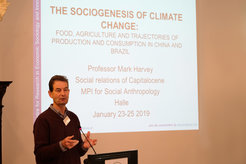Davos, Double Movements and the Devaluation of the World
Authors: Chris Hann and Lale Yalçın-Heckmann
Our title highlighted the concept of Capitalocene, as popularised by US sociologist Jason Moore (who was regrettably unable to participate in the conference). Moore’s Marxist critique of the commoditisation of nature was taken up in the opening keynote lecture by Gareth Dale (Brunel, London), who began by noting deteriorating snow conditions in the Alps, including Davos, where the World Economic Forum was currently taking place. Dale emphasized the novelty of capitalist temporality in world history. Dale backed up his propositions concerning the futility of “unending economic growth” with close attention to anthropology (e.g. Evans-Pritchard on “ecological time”), climate science (the planet’s “blessed” era of the last 10,000 years is surely over) and modern German literature (especially Thomas Mann and Walter Benjamin). According to his interpretation, the late work of Benjamin and his concept of the “jetzt Zeit” should be understood not as aestheticized defeatism at a perilous moment for humanity, but rather, with an eye on the future, as a warning against complacency.

Questions of temporality were raised in numerous more prosaic ways over the following two days, notably with regard to the transmission of family businesses. Striking examples provided by our guests included Andrew Ofstehage’s account of US agrarian entrepreneurs acquiring vast estates in Brazil. The smallholder immigrants from Europe who established capitalist farms in the Midwest still identified with the land they owned and intended to pass on within the family. But many of those enterprises are no longer viable. In the new “plantationocene” on yet another continent, businessmen manage their real property with the sole objective of maximising profits, neglecting stewardship and sustainability issues.
Gareth Dale is best known for his many books and articles about Karl Polanyi. At this conference, however, Polanyi’s mantle was adopted more explicitly by our other keynote speakers, Ayşe Buğra (Boğaziçi, Istanbul) and Mark Harvey (Essex). The former applied the Polanyian notion of reciprocity to shed light on contemporary state-business relations in Turkey. The Justice and Development Party led by President Erdoğan, the culmination of several decades of “political Islam”, has been at the forefront of a deeply rooted rejection of Western capitalist society. According to Buğra, the construction of a “homo islamicus” in opposition to the “homo economicus” of the West can be understood in the terms of a “double movement”, the image used by Karl Polanyi to capture society’s efforts to protect itself against the depredations of a “disembedded” market economy. The reality for the working classes under the present regime was bleak, Buğra emphasized, since the power of labour unions had declined greatly since the 1980s.

Mark Harvey questioned how any economy could possibly be described as disembedded. For him, Polanyi’s notion of institution is what really matters: all markets depend on legal and political instruments and conventions as much as they do on increasingly impersonal forces of supply and demand. For Harvey, the very notion of Capitalocene implies a “straw man” construction of capitalism (a word that Polanyi himself used very rarely). The more established term Anthropocene is also dubious, since it is patently not the case that a universal humanity is responsible for contemporary predicaments. Instead Harvey recommends (and practices) close-up investigations of the “sociogenesis” of the challenges facing us. Intensifying connections between Brazil and China cannot be grasped in terms of a generalised globalisation model, but are the complex outcome of variation in three crucial domains: resource environments, political institutions, and “cultures of consumption”.
Harvey’s neo-Polanyian focus on institutionalisation seemed helpful in making sense of all the case studies presented, both by REALEURASIA researchers and our guests. For example, specific legal provisions concerning who qualifies as an Indian and is thus able to benefit from a highly regulated gambling economy were outlined by Courtney Lewis in her study of the Eastern Band of the Cherokee Indians in the contemporary USA. Leilah Vevaina explained how particular ideals of philanthropy and legal Trusts have enabled the retention and consolidation of property by the Parsi minority in Mumbai. Tom Cliff showed how the local state in a Chinese township is institutionalised differently by local elites according to economic sector, with major implications for welfare provision.

All this might seem a far cry from the focus of the ”Realising Eurasia” projects on continuity and change in small enterprises. Discussant Tobias Köllner drew attention to some of the problems in defining what exactly qualifies as a family business. Ayşe Buğra suggested the phrase “families in business” (and we may well appropriate this as the title of a collective publication as the project comes to an end). Of course, metaphors of kinship and care are also deployed – more or less cynically - by transnational corporations such as Volkswagen, whose operations in the Mexican city of Puebla were described by Alejandra González Jiménez. It was pointed out (by Rachel Smith, another of our Discussants) that 100 such companies are responsible for some 70% of greenhouse gas emissions. No one at this conference offered easy panaceas – “fair trade” (investigated at both ends of the commodity chain by Laurel Zwissler) is riddled with ambiguities, and notions of corporate social responsibility have little credibility anywhere.
It would be misleading to claim that this meeting resulted in any new theoretical consensus. For example, Discussant Erik Bähre reminded us that a very different concept of sociogenesis was creatively deployed by Norbert Elias. Issues of social reproduction, care work, and dignity featured prominently in several sessions, but there were differences of opinion in how best to operationalise multiscalar approaches. Don Kalb, in his Discussant’s contribution, returned to the concept of value, introduced at the beginning by Gareth Dale. Kalb highlighted the accelerating “devaluation of work” that has occurred in the context of the “globalisation of the capitalist value regime.” Individual REALEURASIA researchers will doubtless draw on these concepts and other contributions to this convivial meeting as they complete their dissertations and publish the results of their research. Whether or not they make use of his own “special tool box,” we think Karl Polanyi would approve.
For the programme of this Workshop and further detail see


